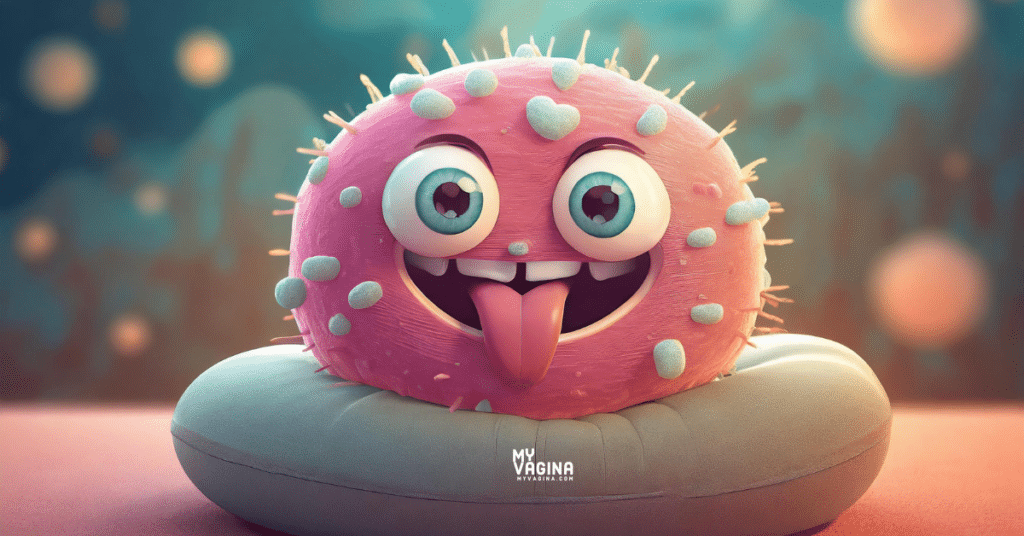Research has revealed that those with bacterial vaginosis (BV) also often have the same dysbiosis (bacterial imbalance) in their mouths. That’s right. BV in the mouth.
When you are treating BV, you also need to consider that you and anyone you are kissing regularly or receiving or giving oral sex may be transmitting these bacteria from the mouth or genitals.
BV-related bacteria and biofilms are found in and on penises and vaginas and can be transmitted to the mouth after repeated exposure, particularly in long-term couples.
Only a few research pieces shed light on BV-causing bacterial colonisation of the mouth, which are discussed below.
Mouth health and BV are related1
One study presents findings of clinical features of periodontal tissues – the mouth and gums – in a patient group diagnosed with BV.
Researchers looked for the correlations between bacteria in the mouth and vagina, discovering that all the women in their study group who had BV also had general inflammation and periodontal disease of varying severity.
Gardnerella vaginalis, which is not normally found in the mouth, was detected using sensitive PCR testing in the mouth and the vagina of all the women in the research.
The major markers of BV were also found in the mouths of these women, such as a less acidic vaginal pH and a decrease in salivation rate.
There was also more mucous present, as well as classic BV markers such as clue cells, which are not normally present in the mouth.
The links between BV and periodontal disease2
Another study of over 3,500 women examined the association between periodontal disease and BV.
The women in the study had their vaginal microbiome evaluated every three months for a year, with a dental examination at the first study visit.
At the first visit, about 40 per cent of the women had a diagnosis of bacterial vaginosis, while 25 per cent had periodontal disease. The number of dental ‘sites’ of concern in women with BV was significantly higher than in women without BV.
As the number of dental sites increased, so did the risk of having bacterial vaginosis. The greater number of dental sites was significantly associated with higher Mobiluncus and G. vaginalis or Bacteroides but not Lactobacillus.
The greater the number of dental sites present, the greater the chance of having odour using the whiff test (fishy odour), typical BV-like discharge, clue cells, a high vaginal pH (>4.5) and Trichomonas vaginalis.
Links of BV, dental infections and preterm labour3
A study examined the relationship between BV and periodontal infection in 500 pregnant women to see what the connection may be between preterm birth and periodontal disease. The women were divided into four groups of 50.
- Group 1 was the control and did not have BV or periodontal infection
- Group 2 tested positive for periodontal infection but not BV
- Group 2 tested positive for BV
- Group 4 tested positive for both BV and periodontal infection
Both BV and periodontal infection separately correlated to preterm labour and premature rupture of membranes and were considered statistically significant.
Dental disease, BV and sex practices4
Another research project looked at the association between periodontal disease, BV, and sexual practices using data from over 3,500 women.
Twenty-eight per cent of women with BV had periodontal disease, compared to 22 per cent who did not. This result equates to a 1.29 per cent greater chance of periodontal disease in women with BV.
Women with BV giving oral sex to uncircumcised men had a greater risk of periodontal disease than those giving oral sex to circumcised men, though this was not considered statistically significant.
How do I clean BV bacteria and biofilms out of my mouth?
If you or someone you are kissing or giving/receiving oral sex to or from has been in contact with or has BV, use My Vagina’s unique, effective BV mouth treatment to reset your oral and vaginal microbiome.
When a partner with a penis is also undergoing treatment, use the Killing BV Penis Treatment Guide.
References
- 1.Petrushanko T, Shul’zhenko A, Krutikova E. [Condition of periodontal tissue in women with bacterial vaginosis]. Georgian Med News. 2014;(237):24-28. https://www.ncbi.nlm.nih.gov/pubmed/25617096
- 2.Andrews W, Jeffcoat M, Schwebke J, Klebanoff M, Zhang J, Cliver S. Longitudinal study of vaginal flora: Increasing periodontal disease (PD) burden is associated with increased risk for bacterial vaginosis (BV). American Journal of Obstetrics and Gynecology. Published online December 2005:S186. doi:10.1016/j.ajog.2005.10.750
- 3.Huck O, Tenenbaum H, Davideau J-L. Relationship between Periodontal Diseases and Preterm Birth: Recent Epidemiological and Biological Data. Journal of Pregnancy. Published online 2011:1-8. doi:10.1155/2011/164654
- 4.Zabor EC, Klebanoff M, Yu K, et al. Association between periodontal disease, bacterial vaginosis, and sexual risk behaviours. Journal of Clinical Periodontology. Published online July 15, 2010:888-893. doi:10.1111/j.1600-051x.2010.01593.x







